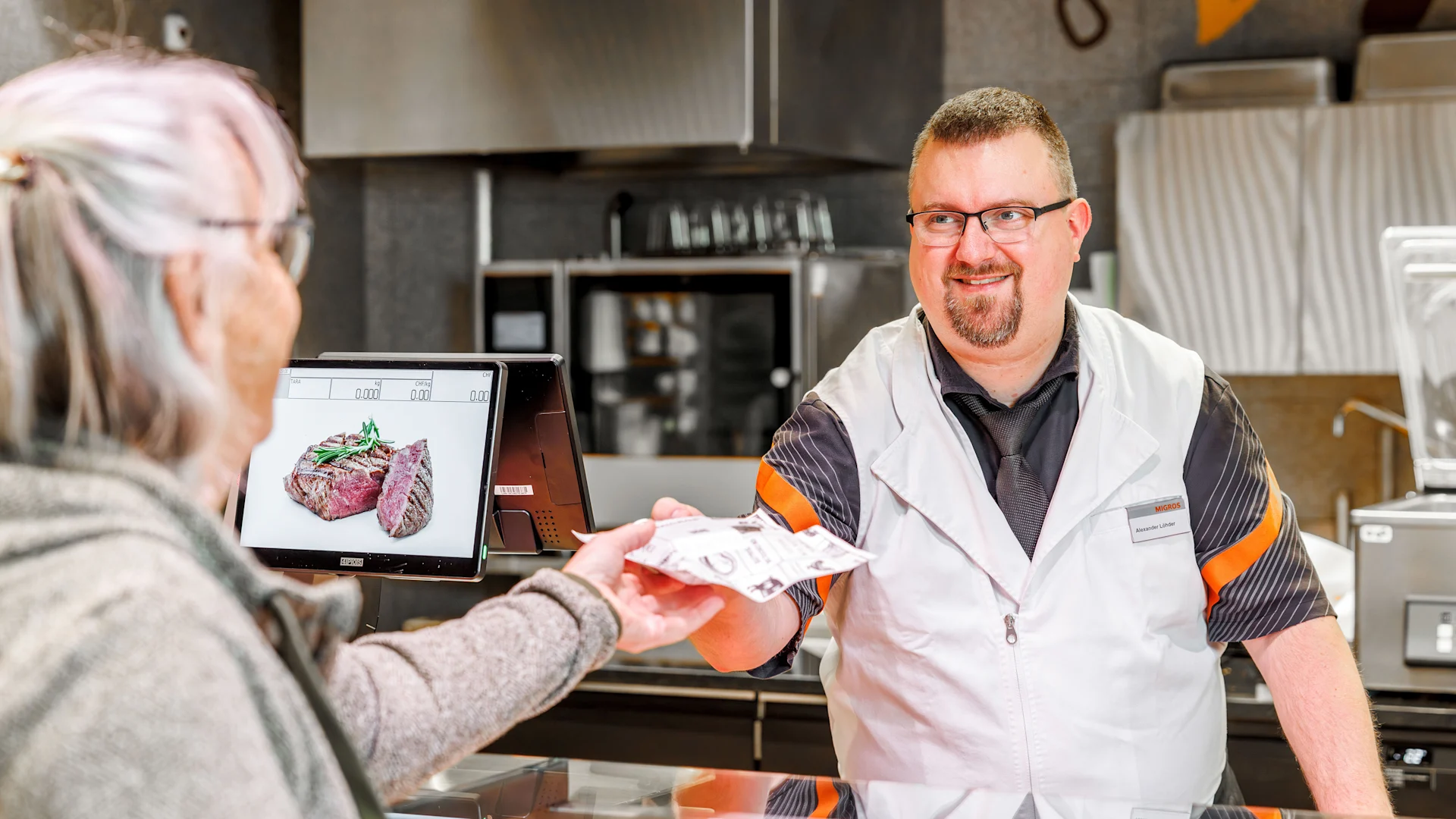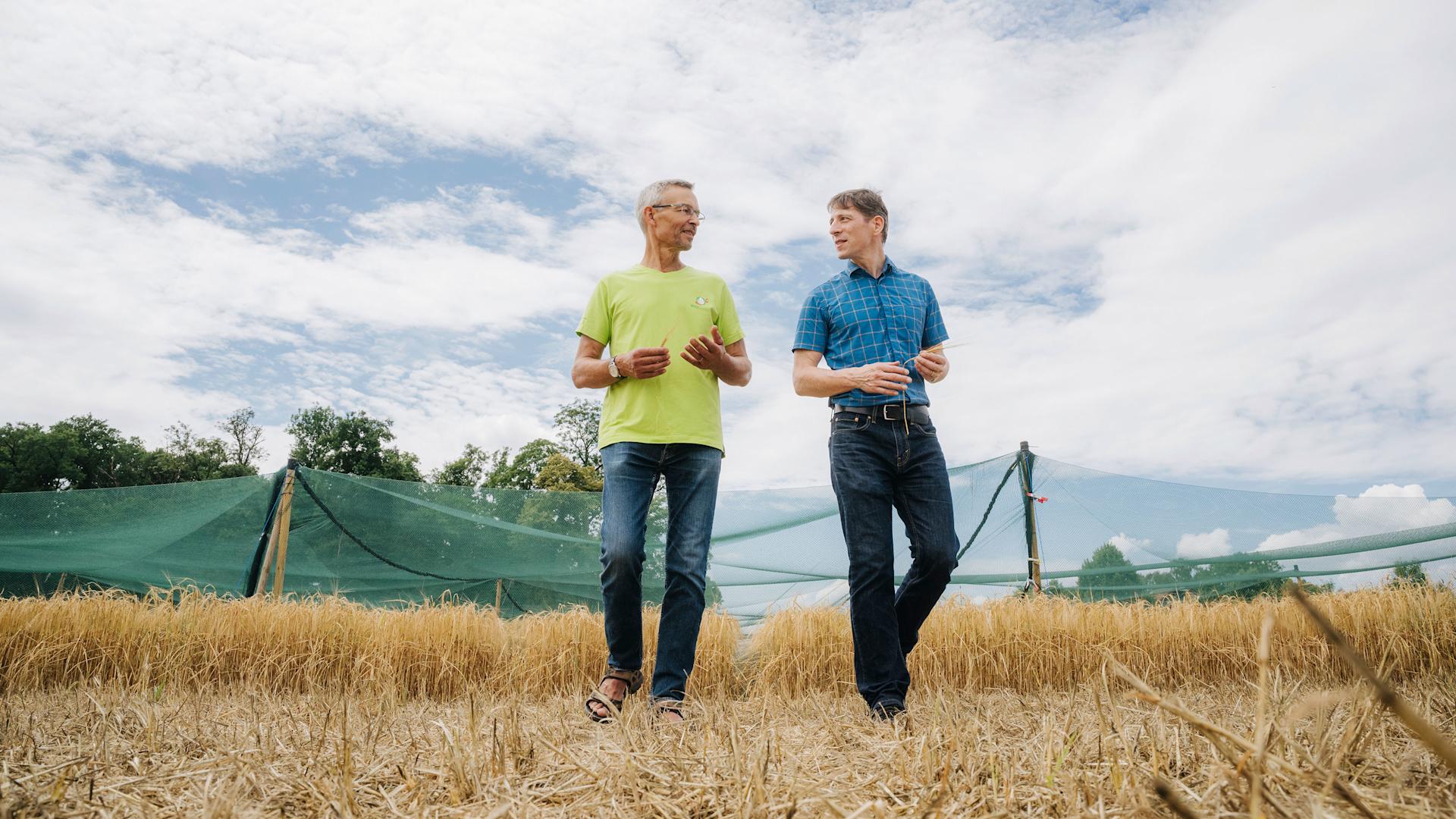
A look behind the meat counter
What customers want in the run-up to the festive season and the mistakes many people make when preparing meat.
navigation

Farming
Should genetic engineering be permitted in agriculture? Bio Suisse President Urs Brändli and Roland Peter, Head of Plant Breeding at Agroscope, discuss the issue.
Wheat, apples and lettuce must become more robust so that they can cope with climate change better and require fewer pesticides. Everyone agrees on that. But how? Do we leave the job to Mother Nature or give her a helping hand with methods like “genetic scissors”?
The moratorium on genetic engineering, which bans the commercial cultivation of genetically modified plants, was adopted 20 years ago by popular initiative. Since then, the Swiss Parliament has extended it several times.
In the meantime, science has evolved. In contrast to the original procedure, in which genetic material was supplemented with genes from completely foreign species, researchers can now modify DNA precisely and, for example, switch off the exact gene that makes a plant vulnerable to a particular disease.
Such gene activation and deactivation also happens naturally and spontaneously, for instance through exposure to sunlight. The so-called CRISPR/Cas or “genetic scissors” method has become the standard in research. In 2020, the team that developed it received the Nobel Prize for their work.
Here in Switzerland, the moratorium on genetic engineering is due to expire again at the end of 2025. After this, the Federal Council suggests extending it for conventional genetic engineering until 2030. Field trials using plants from new plant breeding technologies are still permitted under strict conditions. Researchers and many in the agricultural and foodstuffs industry see this as a missed opportunity, claiming that the suggested limits on such technologies are too restrictive.
Roland Peter, the Head of Plant Breeding at Agroscope, the Federal Government's centre of excellence in agricultural research, discussed new agricultural technologies with Bio Suisse President Urs Brändli, who is a farmer himself.
Roland Peter, we are standing on an Agroscope test field, a so-called “protected site”. What do we see here?
Peter: The barley growing here is the first plant in Switzerland that was produced using genetic scissors. Our research partners switched off a gene in order to get more grains on each ear.
Urs Brändli, as an organic farmer, how does that make you feel?
Brändli: I have nothing against scientists gaining experience. But from an organic point of view, this interferes too much with creation. It's important not to neglect conventional breeding practices, by which I mean classic crossing of parent plants. We also want to let Mother Nature do the breeding.
Surely humans also intervene in conventional breeding?
Brändli: Yes, but with established methods, it is the plant, not Man, that decides where in the genome something changes.
We can look at the DNA of plants and select those with desirable characteristics.
Peter: We've been outwitting Mother Nature for a long time. The corn that is grown today is a breeding achievement developed over many centuries through targeted selection. Molecular biology now enables us to look at the DNA of plants and select those that have desirable characteristics. Why shouldn't we apply this knowledge to other situations by not only selecting, but actually making the change ourselves and thus cutting corners?
Brändli: We don't yet know whether this really cuts corners. The method may be precise, but mutations often have unforeseen consequences. And it only becomes clear in nature whether the plant will thrive.
What are the aims of the new breeding method?
Peter: We want to increase yields with a view to securing supplies and making plants more resistant to disease and drought.
Plants that need fewer pesticides and fertilisers are organic, aren't they? Do you reject new breeding technologies in order to protect your organic label?
Brändli: It's about protecting Mother Nature, not our label. Robust varieties already exist, but demand for them is low. Gala, the most popular type of apple in Switzerland, is one of the most sensitive varieties. There are other varieties, but you can't find them at Migros or Coop. What's more, the soil is much more important than the type of plant. We need healthy, vibrant soil.
Peter: Soil is also a big issue for Agroscope. We want to use new breeding methods to develop plants that require less spraying and care. This also protects the soil.
We don't know the long-term effects of genetic manipulation.
Where do you see the risks of the new breeding technologies?
Brändli: Firstly, the promises of salvation tempt us to simply carry on as before and farm our soil intensively. Secondly, we don't know the long-term effects of genetic manipulation. Thirdly, there is a risk of diminishing resistance, as pests adapt to the modified genes in the long term. As a result, the resistance is no longer effective and the plant becomes diseased.
Peter: I don't share the fear about diminishing resistance. Pathogens constantly change alongside their host plant as a result of natural mutations, and resistance can also improve again later. We combine different resistances to stay one step ahead of the game. One example is the potato, which is better protected nowadays thanks to resistance taken from wild potatoes. New breeding technologies have produced good results in this area in the Netherlands.
Brändli: The Netherlands in particular shows that things can be done differently: the country has introduced 32 new late blight-resistant varieties to the market using conventional breeding.
How are other countries regulating new cultivation methods?
Peter: In the US and Argentina, plants from new breeding methods can be authorised relatively easily and without declaration requirements. The EU is also examining this, but only for plants that could also have developed naturally. If we in Switzerland were to maintain our strict rules for such plants, we would have to go to great lengths to check all imported food to prove whether or not it was produced using genetic scissors. We also depend on seed exchange for plant cultivation and agriculture.
Consumers want to know which products originate from new breeding methods.
Brändli: It's important that such seeds are labelled. Consumers want to know which products originate from new breeding methods.
Peter: The EU is planning such a declaration for seeds. This would also be a good approach for Switzerland.
The Swiss have reservations about genetically modified food. Why?
Peter: This is due to the beginnings of genetic engineering, for example Bt-corn, which produces a protein that kills the European corn borer and thus enables monocultures. We don't want such extreme systems. The new breeding methods operate differently.
Brändli: Genetic engineering is often associated with monocultures such as corn or soya. There is a risk of reducing diversity. Only a handful of companies control worldwide seed production.
Plant breeding creates genetic diversity.
Peter: Loss of biodiversity is a huge problem. However, plant breeding creates genetic diversity. Organic farming promotes biodiversity, but at the expense of productivity.
Brändli: We aren't aiming to maximise yields, but to optimise them.
Peter: The question is where this optimum lies. Research and innovation can help to improve yields.
What do you want from politicians?
Brändli: Smart legislation that takes reservations into account. Anyone who wants to forego new breeding methods should be able to do so, whether they are farmers, retailers or shoppers. This requires declarations and freedom of choice.
Peter: More room for manoeuvre! For example, the hurdles for testing breeds from new technologies are currently very high. Fewer requirements would facilitate broader testing and provide better data, making the potential of new methods more visible.
Discover exciting stories about all aspects of Migros, our commitment and the people behind it. We also provide practical advice for everyday life.